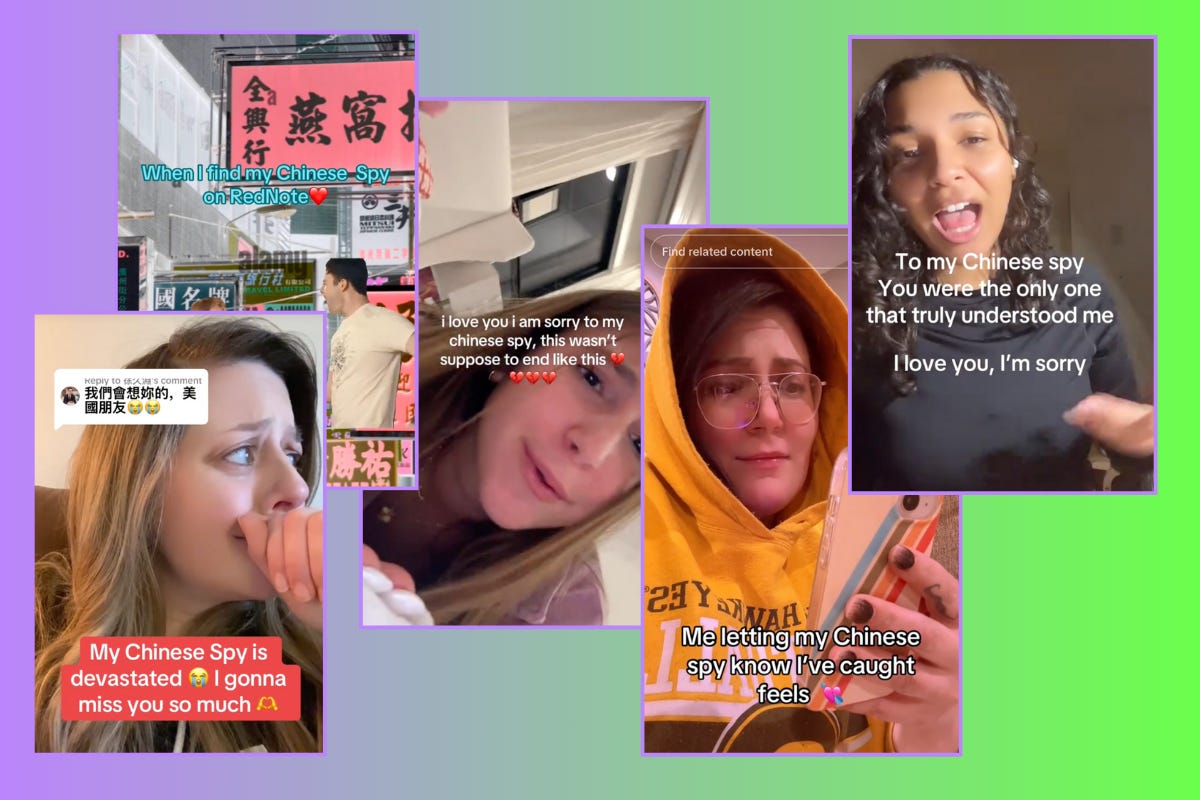The allure of dictatorship & the dangers of memes
The failures of neoliberalism and austerity and the failures of the left have contributed to a retreat into cynicism and into a curiosity towards authoritarianism.
It’s only been three days since inauguration, and I can tell through the mycelial network that you’re just as exhausted as I am. Maybe, I’ve been watching too much Star Trek.
The air is filled with despair. None of us can keep up with the downpour of executive orders, things seem to be changing by the day, sometimes by the hour, and there’s even political analysis about why there wasn’t a mass mobilization during inauguration despite the Trump’s last inauguration being largest single-day protest in U.S. history (only surpassed by George Floyd racial justice uprising three years later).
Last week in the midst of the will-they-won’t-they TikTok ban, millions of Americans left the platform and joined Xiaohongshu, also known as Red Note or Little Red Book literally translated.
There was a sort of exhilarating surge of Americans taking this action as a “fuck you” to our government. Many of them talked about how it felt like they were part of a movement. One comment asks, “guys, are we… organizing?”
No, this exodus from TikTok wasn’t organizing, lest we sully its name! Organizing centers relationships and long-term power-building. We were, however, witnessing mass grassroots online action.
It was emotional, even beautiful, to watch a newfound camaraderie between the Americans and the Chinese, many of whom had never had contact in online spaces before. Against all odds, the Americans were willing to learn how to use an interface that wasn’t in their primary language, they were very quickly encouraged to use bilingual captioning (and did so!), and they even started learning Mandarin.
I watched dozens of videos of Americans talking about how we were lied to about China—look how good they have it! Their cities are incredible! The technological advancement! The low cost-of-living! The healthcare! Of course we are dissatisfied, living in the country we’ve been taught is the best country in the world, while navigating working long hours at multiple jobs for very little pay, taking out hundreds of thousands of dollars in debt for school or cancer treatment, and crossing our fingers we never need an ambulance ride.
The facade easily crumbles.
This surge in spite-downloading of Xiahongshu was accompanied by content making light of surveillance and data privacy, memes about “my Chinese spy” were reminiscent of the NSA memes after we learned that the agency was engaged in mass surveillance.
I know I’m not the only one who still picks up their cell phone and jokingly puts it closer to my face when I’m talking about sensitive issues. Ten years ago, the joke was the government was listening to us to spy. Today, the joke is that the platforms are listening to sell us things. The distinction between government and corporations is increasingly collapsing.
Matt Mitchell, a hacktivist who also happens to be a dear friend, told VICE a few years ago, these memes are counter productive. “You make the joke because you don’t want to believe it’s real,” they said. These memes are a byproduct of fear and a sense by individuals that they are powerless to act against government surveillance. “Fear makes people want to give up,” Matt said.
The comments section of these videos were peppered with counter-arguments. Don’t they know how China only looks great because the people there can’t criticize their government? Don’t they know about the online censorship of social media, tv, newspapers, radio, movies? Don’t they know that you could get a knock on your door for posting the wrong thing, no warrant needed?
As it turns out, they did know about the political repression and online censorship in China, they just didn’t care. More aptly, they thought the trade-off was worth it. Wouldn’t you be willing to take a bit of dictatorship in exchange for free ambulance rides? Where has this American promise of democracy gotten us anyway?
Inadvertently, as our country unravels, as this empire has begun to fall, and as we long for a state-curated idea of dictatorship from a handful of social media interactions, we are playing into a right-wing fantasy. But these are just memes, aren’t they? We’re just poking fun and protesting the American government, aren’t we?
Enter Curtis Yarvin, the far-right (and increasingly more mainstream) influencer and proponent of the "dark enlightenment" in which he advocates for dismantling democracy in favor of an autocratic system. He is part of a growing number of thinkers pushing the idea that everything would be so much more efficient, better for everyone, if we purged federal bureaucracies and consolidated executive power. We would be better off under an autocracy because it would lead to economic growth, social stability, and less conflict! No more polarization, no more partisanship, no more gridlock! Politics wouldn’t dominate our public life, and aren’t we tired of it all, aren’t we just exhausted by the onslaught of news, and instead we could spend our days focusing on our personal lives. The personal is not the political! It never was!
If this sounds like J.D. Vance, rest assured these fascists are reading their history. I’m not against sending a “fuck you” to our government when we don’t like what the people in power are doing, but we should be reading our history, too. Our fuck you’s to our government need to be strategic, not laying the groundwork for neototalitarianism.
Erich Fromm wrote eighty years ago in Escape from Freedom, about why individuals might reject freedom and democracy in favor of authoritarianism, especially when freedom comes with uncertainty or insecurity. Humans, he argues, desire freedom but we also find it deeply unsettling because it comes with responsibility, uncertainty, isolation. Democracy demands active participation, critical thinking, and moral responsibility. It’s hard work.
The failures of neoliberalism and austerity and in turn the inadequate response from the left over decades have contributed to this retreat into cynicism and into this curiosity towards authoritarianism. And we need to question who benefits from it all?
And it’s not black or white. Our choice isn’t between present-day America and present-day China. We have many alternatives to liberal democracy that aren’t autocracy.
There’s participatory democracy in which we engage in decision-making ourselves rather than delegating our power to representatives (think Occupy Wall Street);
There’s direct democracy in which we vote on all policies and laws directly rather than through elected officials (think worker cooperatives);
There’s deliberative democracy which emphasized debate and consensus-building among stakeholders (think community forums);
There’s community-controlled systems in which resources are redistributed and collectively owned by the people (think Black Panthers);
There’s anarchism which rejects centralized authority in favor of autonomous communities (think mutual aid networks);
There’s syndicalism where our economic and political systems are controlled by workers through unions and federations (think IWW);
And of course there are many indigenous governance systems that prioritize collective decision-making, consensus-building, and respect for nature.
These models, and the infinite more that we have yet to experience or dream up, surface out of a critique of representative democracy and dissatisfaction with elite capture of our institutions and the alienation of regular people from decision-making bodies. It’s hard to fight to save something that doesn’t feel worth saving. We have been told we live in a democracy, but have we ever, really?
Our job right now is to fight the despair. I’m not going to tell you to breathe deeply or drink more water, but I will urge you that now is the time to be earnest rather than cynical.
The next few weeks, months, years will require individual action, community organizing, and strategic resistance to counteract what’s coming. The things that matter, really matter, are throwing and attending parties, getting to know your neighbors, volunteering at your animal shelter, joining your community garden, showing up to stop an eviction or immigration raid in your town, making and sharing art, hosting a monthly potluck, taking a first aid class, pulling together a few friends for a poetry night or a book club, joining or at least throwing a few bucks at an organization that’s doing good work in your community. This is how we build relationships, and relationships mean resilience.
This week, I’m holding onto words from another friend, LJ Amsterdam, who in her recent report on Hopeful Monsters says, “We don’t always have to pick a fight. We can pick each other up. Reciprocity builds power, a power that offsets our despair. Collective self-determination wields that power through approaches and actions that tell each other: we’re what we’ve got, and we got this.”
If despair takes hold of you, talk to a friend and remember that our ancestors have been here before. Read Gene Sharp and Erica Chenoweth and Ella Baker and Hannah Arendt and George Lakey and and Angela Davis and Stephen Zunes. Social movements have toppled dictatorships globally, many times, and we will continue to do so.







We fight hate with love and kindness. Wearing a😷 is a simple way to protect yourself and others and fight fascism 🕊💕
Excellent piece, Dizzy! As someone who studied the Cultural Revolution and the role of Mao's little red books in college, you articulated the false binary some many people feel of choosing between a Chinese-style dictatorship and our current American-style unraveling. We the people have a lot of modes of governance to choose from!